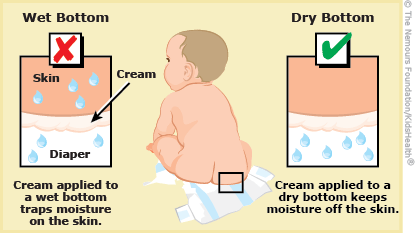How to Treat Diaper Rash
What Is Diaper Rash?
Diaper rash is a common skin condition in babies. Most diaper rashes are caused by irritation of the skin from contact with pee, poop, sweat, or the diaper itself, but some diaper rashes are caused by allergies.
What Are the Signs & Symptoms of Diaper Rash?
Signs of diaper rash caused by irritation or allergy include:
- soreness
- red or discolored skin where the diaper touches the skin
- peeling
- scaly skin
- fussiness
If the diaper rash is caused by a skin infection due to yeast or bacteria, it often appears in skin folds and creases and can also cause blisters, open sores, or pus-filled sores.
What Should I Do if My Baby Gets Diaper Rash?
- Try to keep the skin dry.
- Whenever possible, let your baby spend time without a diaper. Put your baby in a crib with a waterproof mattress cover or on a towel on the floor.
- Check the diaper often and change it as soon as it is wet or soiled.
- With each diaper change:
- Wash your baby's diaper area gently with warm water. When your baby has a diaper rash, try to avoid soaps and baby wipes (these can irritate sore skin).
- Let the skin dry fully. Then apply a diaper ointment or paste that contains zinc oxide (such as such as Desitin, Triple Paste, Balmex, or a store brand).

How Do Doctors Treat Diaper Rash?
Depending on what type of rash your baby has, the doctor may recommend changes to your diapering routine. If those changes don't work, your doctor may suggest an antifungal cream or an antibiotic cream. For a rash caused by an allergic reaction, the doctor may prescribe a mild steroid cream for a few days until the rash goes away.
When Should I Call the Doctor?
Call the doctor if your baby has diaper rash and:
- The diaper rash doesn't get better after several days.
- There are pimples, blisters, or open sores in the diaper area.
- Your baby has diarrhea with a fever or looks dehydrated.
- Pus is draining from the rash.
- Your baby seems very uncomfortable.
- Your baby has a fever of 100.4°F (38°C) or higher.
What Can Help Prevent Diaper Rash?
The best way to prevent diaper rash is to keep your baby's skin as dry and clean as possible. Change diapers often so pee and poop won't irritate the skin. Also:
- Use diaper ointment or paste with every diaper change.
- If you use baby wipes, be sure they're fragrance-free.
- If you use cloth diapers, wash them in dye- and fragrance-free detergent and do not use fabric softener or dryer sheets.

